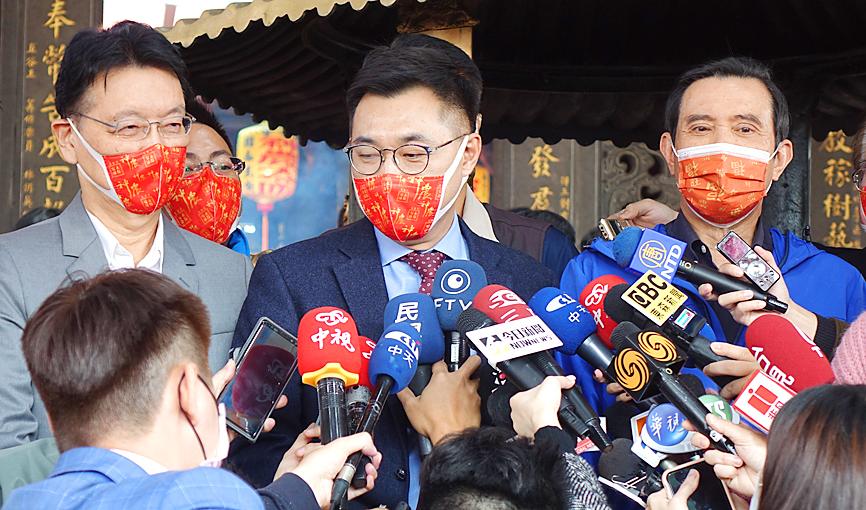Former president Ma Ying-jeou (馬英九), Chinese Nationalist Party (KMT) Chairman Johnny Chiang (江啟臣) and Broadcasting Corp of China chairman Jaw Shaw-kong (趙少康) yesterday visited the Xianse Temple (先嗇宮) in New Taipei City’s Sanchong District (三重), vowing to unify the party and return it to power in 2024.
Ma worshiped and gave red envelopes to temple visitors at the invitation of KMT Secretary-General Lee Chien-lung (李乾龍), who is also the temple’s chairman.
Jiang and Jaw joined Ma at the temple, and their interactions were closely watched by the news media, as Jaw last week announced his bid to enter the KMT’s presidential primary, about a week after he announced his return to the party after leaving it in 1993.

Photo: Wang Yi-sung, Taipei Times
“I hope Jaw’s return will encourage other members who have lost contact with the party to return to the fold as well. [KMT Legislator] Chiang Wan-an (蔣萬安) also expressed his willingness to shoulder his responsibility. Both are positive developments for the party,” Ma said, referring to remarks by Chiang Wan-an in a political talk show on Friday that he would not shun his responsibility when asked if he would run in the Taipei mayoral election next year.
Asked if he would encourage Jaw and Johnny Chiang to pair and contend in the 2024 presidential election, Ma said the party has an established mechanism to elect presidential candidates, whom the party would support.
Johnny Chiang said whoever is chosen to represent the party in 2024 should be supported by all party members.
Jaw said he joined Ma in his visit to the temple for the sake of party unity.
“The KMT lost the presidential election in 2020 because of its failure to unite party members. The party has to be united for the 2024 presidential election. Those interested in participating in the 2024 presidential election should fairly compete with one another for the spot,” he said.
Ma and Jaw said that President Tsai Iing-wen’s (蔡英文) administration should not immediately dismiss the possibility of using Chinese-made COVID-19 vaccines.
“We do not know how the pandemic situation will change. We should not give up on any potential source of vaccines, which could add one more layer of protection for the public,” Ma said.
Jaw said Taiwan should show a goodwill gesture after Tsai said Taiwan and China should forge a dialogue.
He also urged the Tsai administration to stop calling COVID-19 the “Wuhan pneumonia,” saying such a discriminatory and derogatory term would not help improve cross-strait relations.
Minister of Health and Welfare Chen Shih-chung (陳時中) later yesterday said there is insufficient information, such as studies published in scientific journals, about Chinese vaccines to consider them candidates.

Taiwan has received more than US$70 million in royalties as of the end of last year from developing the F-16V jet as countries worldwide purchase or upgrade to this popular model, government and military officials said on Saturday. Taiwan funded the development of the F-16V jet and ended up the sole investor as other countries withdrew from the program. Now the F-16V is increasingly popular and countries must pay Taiwan a percentage in royalties when they purchase new F-16V aircraft or upgrade older F-16 models. The next five years are expected to be the peak for these royalties, with Taiwan potentially earning

STAY IN YOUR LANE: As the US and Israel attack Iran, the ministry has warned China not to overstep by including Taiwanese citizens in its evacuation orders The Ministry of Foreign Affairs (MOFA) yesterday rebuked a statement by China’s embassy in Israel that it would evacuate Taiwanese holders of Chinese travel documents from Israel amid the latter’s escalating conflict with Iran. Tensions have risen across the Middle East in the wake of US and Israeli airstrikes on Iran beginning Saturday. China subsequently issued an evacuation notice for its citizens. In a news release, the Chinese embassy in Israel said holders of “Taiwan compatriot permits (台胞證)” issued to Taiwanese nationals by Chinese authorities for travel to China — could register for evacuation to Egypt. In Taipei, the ministry yesterday said Taiwan

Taiwan is awaiting official notification from the US regarding the status of the Agreement on Reciprocal Trade (ART) after the US Supreme Court ruled US President Donald Trump's global tariffs unconstitutional. Speaking to reporters before a legislative hearing today, Premier Cho Jung-tai (卓榮泰) said that Taiwan's negotiation team remains focused on ensuring that the bilateral trade deal remains intact despite the legal challenge to Trump's tariff policy. "The US has pledged to notify its trade partners once the subsequent administrative and legal processes are finalized, and that certainly includes Taiwan," Cho said when asked about opposition parties’ doubts that the ART was

If China chose to invade Taiwan tomorrow, it would only have to sever three undersea fiber-optic cable clusters to cause a data blackout, Jason Hsu (許毓仁), a senior fellow at the Hudson Institute and former Chinese Nationalist Party (KMT) legislator, told a US security panel yesterday. In a Taiwan contingency, cable disruption would be one of the earliest preinvasion actions and the signal that escalation had begun, he said, adding that Taiwan’s current cable repair capabilities are insufficient. The US-China Economic and Security Review Commission (USCC) yesterday held a hearing on US-China Competition Under the Sea, with Hsu speaking on